Summary 
Shakespeare's uncomplicated drama is an effectively rendered military tragedy with thematic echoes from other, greater stories. Expert performances - especially the flawed title hero and his domineering mother - and concise direction make for strong entertainment despite the text's rather thin examination of duty to country, family, and self.
Design
Directed by David Muse. Scenic design by Blythe R.D. Quinlan. Costume design by Murell Horton. Lighting design by Mark McCullough. Compositions and sound design by Mark Bennett.
Cast
Lise Bruneau (Valeria), Diane D'Aquila (Volumnia), Nick Dillenburg (Lartius), Philip Goodwin (Brutus), Reginald Andrew Jackson (Aufidius), Aaryn Kopp (Virgilia), Patrick Page (Coriolanus), Steve Pickering (Cominius), Robert Sicular (Menenius/Octavio), Derrick Lee Weeden (Sicinius), Hunter Zane (Young Marcius).
Analysis
The Shakespeare Theatre Company's Coriolanus is presented in rotating repertory with Wallenstein by Friedrich Schiller, both productions using the same set as well as the same costume and lighting designers. The set features six onstage doorways, three on each side of a large high-walled cement anteroom, with matching sliding doors visible on platforms directly above the others. The upstage wall has panels that shift in various permutations, and the walled-in stage area feels something like a coliseum pit. Director David Muse begins with plebeian sweepers, desultory and bored, wearing drab gray uniforms while cleaning the stage floor. Other citizens decorate the stage, vaguely rebellious in gray sashes, caps, and jackets over cargo pants, and they haul drum kits and folding chairs for a speaking event. Aristocratic citizens watch with some disdain from the platforms above, literally and figuratively looking down on the working masses below.
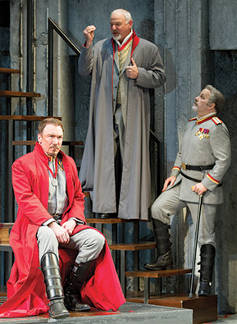
1.1 begins with whispers of defiance as one worker makes a rude noise, then another, drawing admonishing glares from above. Another worker tosses his hat and one shouts "corn!" with an immediate answering cry from another worker: "at our own price!" The drummers begin to drum, then increase volume and intensity as the socio-economic anger grows from a flare to a flame. The aristocrats stand in consternation as a chant of "corn!" begins, but Robert Sicular's fatherly Menenius intervenes, a reasonable and well-spoken gentleman in a vested red suit with a lone gold medal. Sicular's Menenius, gray-haired and goateed, soothes the crowd with his tale of the Belly, and he uses little fluttering hand motions to personify the speaking stomach. In contrast, Patrick Page's unpolitic Coriolanus stomps onstage as if from the set of 300 with staff and sword, supremely confident, his gray military uniform adorned with medals. He has dark brown hair, a goatee and chin beard, and battle scars are visible on his flesh. Page's Coriolanus taps one of the drums on his way in, intimidating the drummer, and when the "fragments" begin to weary of his lecture, he speaks of war and volunteering for combat, smirking as the plebeians hem and haw, then turn and exit.
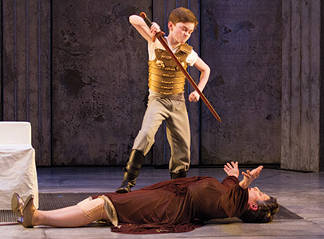
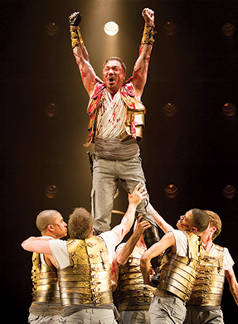
Muse provides a brief glimpse of the home life of Page's mercurial Coriolanus 1.3, a chandelier dropping from the fly to illuminate a martial young Marcius, the blonde-haired Virgilia, and Diane D'Aquila's stern Volumnia. One of their attendants plays chimes and another seems fearful of Marcius as Volumnia proudly recounts the tale of the boy tearing apart a butterfly with his teeth. The ensuing 1.4 battle scene shows Coriolanus attempting to rally his troops, the upstage wall partly open to reveal a breach roiling with fog and pulsating light. The soldiers wear sleeveless shirts and golden armor, but when Page's Coriolanus charges headlong upstage with a war cry, they fail to follow and begin to disperse as the panels slide shut behind their general. He returns moments later, his face and arms smeared with blood, and drums begin to pound as they chant "Marcius!" and hoist him to their shoulders. Coriolanus' sense of honor is apparent 1.8, when he throws down his sword and dagger to instead fight Aufidius hand to hand, and when he snaps his opponent's shoulder out of its socket, he claims victory but lets Aufidius live. When Aufidius is told by an ally that Coriolanus "is the devil," he slams his shoulder back in place and mutters, "bolder." In 1.9, the victorious Romans return, but Page's Coriolanus refuses to be singled out for honor, snatching the drumsticks from a musician and waving him offstage, and in 1.10 he marches through a burst of red confetti to kneel before his mother and offer her the laurel from his head.
Muse presents the political foes of Coriolanus - Sicinius and Brutus - as crass opportunists, their plotting whispers amplified by microphone, their presence signaled by a recurring chime, lit in midnight blue. They beset the rabble against the military from the start in 1.1, both wearing gray vested suits, one bespectacled and puffing a pipe like a college professor. Page plumbs 2.2 for some droll humor, his powerhouse character distraught and out of his element, tugging at his collar and wringing his hands, one knee bouncing up and down nervously. By 2.3 he is a white-robed mess, meeting the rabble and shaking hands, but sniffing his fingers and recoiling at the commoner stench. Sicinius and Brutus further rally the plebeians 3.1 against him, and when Coriolanus appears 3.2 in bright light, adorned with a floor-length red cape, he is quick to anger. He threatens to "pluck out the multitudinous tongue," then throws an old senator down by his neck and fights off two guards, seizing their weapons with which he chases off the rabble.
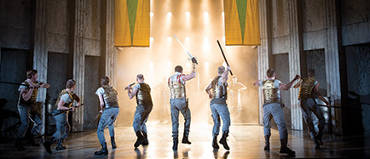
Muse underscores the fickle opinion of the citizenry, echoing themes from Julius Caesar, as the impatient aristocrat becomes a conquering hero then a reviled villain: "this man has marred his future." The extremes of his sense of honor are exposed as juvenile, with D'Aquila's Volumnia scolding him like a willful prepubescent - "dit! dit! dit!" when he tries to speak - then putting his cape over his shoulders as if he is a child. She and the Senators advise him - "mildly! mildly!" - but the plotting tribunes, in their chime and blue light, gain the upper hand - "banish him" - and smile in satisfaction as the mob begins to chant, "it shall be so!" Page's Coriolanus - "this imperious traitor" - again loses his temper, and to rising music, bellows "I banish you!" in a rejection of his ungrateful nation much like that of Timon of Athens. When he disappears into the glowing light and fog upstage, the crowd cheers "he's gone!" and throws their hats in the air as Muse pauses for intermission.
Coriolanus's exile begins the second half of the production. A series of ringing chime notes indicate Volumnia's household, and the matriarch weeps as Page's disgraced general begins to exit with his luggage. In 2.1, when she had learned he was wounded, she had lauded his sacrifice - "I thank the gods for it!" - and Coriolanus comments dryly in 4.1 that she would have done six of Hercules' labors herself if she were his wife. When taking his leave of young Marcius, Page's Coriolanus breaks his son's toy wooden sword over his knee and poignantly gifts him with own steel battle sword. In 4.4 Coriolanus arrives at Aufidius's home, only to be accosted by two impudent servants, one of whom flicks him with a dish rag. Page's Coriolanus knocks him down and executes a martial arts kick to send a loaded serving tray from the other man's hands. The servants then watch as Aufidius and Coriolanus compare battle scars, stripped to their waists, then grapple and wrestle with laughs and shouts. By the time he has allied 4.5 with Aufidius, the servants have become comically gushing - "he is simply the rarest man i' th' world!" - and lift each other by the waist until one injures his back.
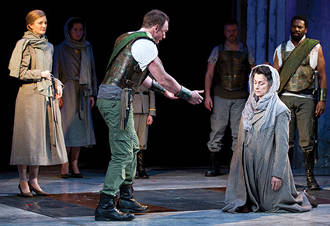
Shakespeare's text lacks the intricate plotting of the other tragedies, Coriolanus really being a one-themed, straightforward drama with little subtlety or complexity, and Muse speeds toward the conclusion. Rumors spread 4.6 that Coriolanus and Aufidius will attack Rome - "this is most likely!" - and 4.7 shows Coriolanus's personal instruction of Volscians in single combat. But Sicinius and Brutus again meet 5.1 with a chime in the dark blue lighting, plotting to use Coriolanus's family against him, and he finds himself undone 5.3. In the glare from six lighting standards carried onstage for the appeal, Virgilia kneels then kisses Coriolanus, and then Volumnia also kneels - "the most noble mother in the world" - and begs him for mercy, then has the three of them - Valeria included - lie prostrate before him: "again down!" Page then has big scene, and he excels, his tough and angry Coriolanus finally showing another dimension as he breaks down sobbing, obeying his demanding parent - "o mother, mother, what have you done?" - no matter the price (much like Hamlet). D'Aquila's similarly strong Volumnia has no such dimension, although she shushes him as he sobs and cries out, red-faced in emotion - and shame - as they exit together upstage.
Muse counterpoints Volumnia's triumph as a Roman hero in 5.5, replete with upstage opening fully to blinding lights and swirls of white fog, to her son's final fall as traitor to the Volscians in 5.6. Aufidius insults Coriolanus as a "boy," a subtle reference to his allegiance to Volumnia, and ominous drums rise in volume and intensity. The Volscian soldiers encircle Coriolanus with a chanting whisper of "kill!" but Page's Coriolanus has the final heroic moment, shouting, "cut me to pieces, Volsces!" as he stabs himself and they fall upon him. Muse enhances the expected conclusion - the aristocrats looking down on the mangled Coriolanus as Aufidius remarks, "he shall have a noble memory" - with an appearance by young Marcius. Coriolanus's tiger-hearted son takes the knife from his dead father and cuts his own hand, smearing the bright red blood across his face, then turning upstage to exit into the light.